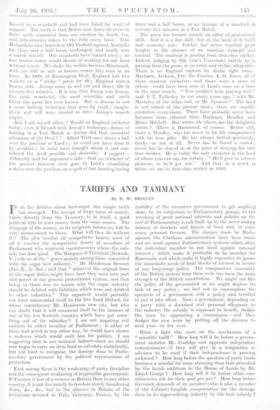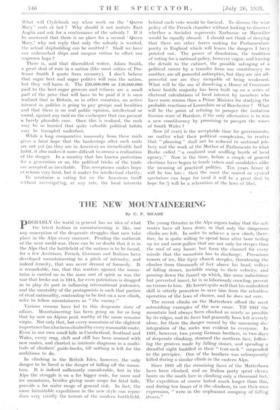TARIFFS AND TAMMANY
By D. W. BROGAN IN all the debates about beet-sugar, one' simple truth has emerged. The receipt of large sums of money, taken: directly from the 'Treasury, is, in itself, a good political title to more Money 'from the same source. The stoppage of the money, so its recipients inform us, will be very inconvenient to theni. What will they do without it ? The Plea toucheS all sympathetic hearts, most "Of all it touches the sympathetic hearts of members of Parliament who represent constituencies where the sub- sidy has done good. The Marquess of Titchileld (Newark, 1,) tells us 'of the " grave anxiety among those connected with the sugar beet industry." Mr. HendersOn Stewart (Fife•E'., L. Nat.) said that " whatever the original form of the sugar duties might have been they were now part and parcel of our 'general protectionist system, and that being so there was no reason why the sugar industry should be debited with" liabilities Which were not debited to other industries." This argument would probably not have commended itself to the late Lord Oxford, for whose constituency Mr. Henderson now sits, but who can doubt that it will commend itself to the farmers of one of the few Scottish counties which have got some- thing out of the subsidies ? I am not imputing evil motives to either member of. Parliament ; if either of w them had acted in any other way, he would have shown a rashness which would unfit' him for politics. I am suggesting that in our national balance-sheet we should now begin to carry an item hard to calculate statistically, but not hard to recognize, the damage done to Parlia- mentary government by the political repercussions of protection.
First among these is the weakening of party discipline and the consequent weakening of responsible government. If Fascism is less of a menace in Britain than in any other country, it is not due merely to freedom slowly broadening doWn, &e., &e., but to the absence in 'Britain of the irritations aroused in Italy, 'a France, by the inability of the executive government to get anythirig done, by its 'subjection to Parliathentary groups, to the wrecking of great national interests and policieS on the reef of Parliamentary revolt' Wilt up by the never-endiiig labours 'of hawkers and buyers of 'local and, iii some cases, personal favours. The charges made by Burke against the Cluithani administration have been Made and are made against Parliamentary systems which allow the individual member to put local against national interest ; which -make it profitable to be" member for Buncombe and which make it highly expensive to ignore the immediate needs of local blocks of interest in favoUr of any long'-range policy. The comparative immunity or the British systea from these evils has been the main strength of the British constitution. We might not like the policy of the government or we might deplore' its lack of any policy ; we had not to contemplate the spectacle of a government with a policy and terrified to put it into effect. Now, a government, depending on a' party with a doctrinal and personal allegiance to the industry the subsidy is supposed to benefit, dodges the issue by appointing a commission—and then dodges the new issue by putting off the decision to next year—or. for ever.
What a light this casts on the mechanism of a " scientific tariff." How long will it be before a govern- ment imitates Mr. Coolidge and appoints independent commissioners—if they will give in a resignation in adVance to be used if their independence is proving awkward ? How long before the question of party funds becomes a scandal far more alarming than that provoked by the lavish additions to the House of Lords by.Mr. Lloyd George ? How lolig will it be before other -con- stituencies aslc for their quid pro quo ? How long before Greenock demands of its member (who is also a member of the Cabinet)tangible compensation for the damage dOne to its Siigar4efining industry by the beet subsidy ? What will Clydebank say when work on the ' Queen Mary ' ends at last ? Why should it not imitate East • Anglia and ask. for a continuance of the subsidy ? If it be answered that there is no place for a second Queen . Mary,' why not reply that only the subsidy is wanted, • the actual shipbuilding can be omitted ? Shall we have our unlaunched ships and unspun cotton to offset our 'ingrown hops ?
There is, said that discredited writer, Adam Smith, a great deal of ruin in a nation (like most critics of Pro- • fessor Smith I quote from memory). I don't believe that sugar beet and sugar . politics will ruin the nation, but they will harm it. The £20,000,000 or /40,000,000 paid to the beet-sugar growers and refiners are a small part of the price that will have to be paid if it is once realized that in Britain, as in other countries, an active interest in politics is going to pay groups and localities and that there is no real public opinion, intellectual or meral, against any raid on the exchequer that can present a barely plausible case. Once this is realized, the rush may he so hurried that quite valuable political habits may be trampled underfoot.
While a long comparative immunity from these raids gives a faint hope that the hankerings after such raids are not yet (as they are in America) an ineradicable bad habit, it also makes it more difficult to arouse a.realization of the danger. In a country that has known protection for a generation or so, the political tricks of the trade are accepted as inevitable. This acceptance makes hope of reform very faint, but it makes for intellectual clarity.
To scrutinize a voting list on the American tariff without investigating, at any rate, the local interests behind each vote would be farcical. To discuss the wine policy of the French chamber 'without looking to discover whether a Socialist represents Narbonne or Marseilles would be equally absurd. I should not think of denying that there arc other forces making for Parliamentare purity in England which will lessen the dangers I havy pointed out. The power of dissolution, the tradition of voting for a national policy, however vague, and leaving the details to the cabinet, the possible .salvaging of a political career by a transfer from one constituency - to another, are all powerful antiseptics, but they are not all- powerful nor are they incapable of being weakened. What will be the use of dissolving a House of Commons whose hostile majority has been built up on a series of electoral calculations of local interest by members who have more reason than a Prime Minister .for studying the probable reactions of Loamshire or of Barchester ? What will be the point of refusing to pamper the imitation Samian ware of Burstein, if the only alternative is to win .a new constituency by promising to pamper the wines of South Wales ?
Now (if ever) is the acceptable time for governments, no matter what their political complexion; to resolve that " planning " shall not be reduced to sectional job- bery and the work of the Mother of Parliaments to what Burke called " a confused and scuffling bustle of local agency." Now is the time, before a couple of general elections have begun to teach voters and candidates alike the meaning of practical polities. Ten years hence it will be too late ; then the most the soured or cynical spectators can hope for (and it will be a great deal to hope for !) will be a relaxation of the laws of libel.






































 Previous page
Previous page